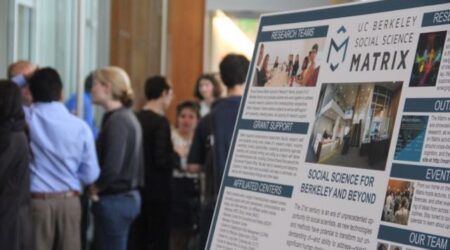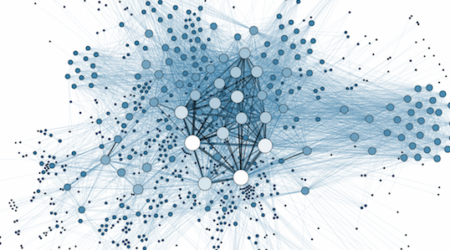How will the labor force be affected by the rise of artificial intelligence? How can linguistic theory help reduce misunderstandings between doctors and their patients? How can courts use social media to investigate and prosecute war criminals? How can public investments in infrastructure ensure equitable access and benefits for disadvantaged groups?
These are among the questions that will be considered by a newly selected cohort of Social Science Matrix Research Teams that will convene during the 2017-2018 academic year. Matrix Research Teams are groups of scholars who gather regularly to explore or develop a novel question of significance in the social sciences. Teams typically integrate participants from several social-science disciplines and diverse ranks (i.e. faculty and graduate students); are focused on a compelling research question with real-world significance; and deploy or develop appropriate methodologies in creative ways.
Matrix supports three types of Research Teams: Prospecting, Project, and Theme Teams. Prospecting Teams receive funding in the amount of $1500 and run for a single semester, typically meeting 5-6 times to explore a new area or question of inquiry and assess whether it has potential for further investigation. Project Teams receive funding in the amount of $5000 and run for two semesters, meeting at least once a month around a defined research problem. Project Teams work toward producing an output, such as a proposal for external funding, a workshop or conference, or a joint publication. Matrix also provides $7500 to teams whose work directly relates to our current theme, “Questioning the Evidence,” and considers changing concepts, practices, and norms related to the collection, deployment, and analysis of data and evidence in the social sciences—and in society at large.
In addition to funding, Matrix Teams receive administrative support in meetings in our offices on the top floor of Barrows Hall. All teams also receive assistance with administering their funding, as well as with research development and communications.
This year’s teams were selected following a competitive process, as proposals were evaluated by faculty members from diverse social science disciplines. “We’re thrilled to have the opportunity to support and work with these teams,” said Lynsay Skiba, Associate Director for Programs at Matrix. “Their research tackles timely issues and applies the sort of innovative, cross-disciplinary methods we aim to foster.”
Below are brief descriptions of the 2017-2018 Matrix Research Teams. Stay tuned to our website for more in-depth profiles of these teams in the coming months.
Expert Language, Native Language: Toward a Framework for Translation in Clinical (Mis)communication
Matrix Prospecting Team (Fall 2017)
Bringing together experts in linguistics, cognitive and data scientists, medical doctors, bioethicists, and medical anthropologists, this Matrix Prospecting Team aims to generate a theoretical framework to address challenges in medical communication, specifically misunderstandings between doctors and patients. “Our project explores challenges in clinical communication, analyzing conversations between patients and physicians via the lens of linguistics and anthropology,” the team wrote in their proposal. “Our prospecting group aims to produce a journal article for a physician audience describing our theoretical model, and through our model, to provide specific recommendations for ways to improve physician communication. Ultimately, this project aims both to better clinical communication and therefore health outcomes, and to develop theoretical frameworks that can ground future research on expert knowledge and communication challenges across disciplines.”
Working, Learning, and Earning in the Age of Intelligent Machines: Considering the Implications of Computation Intensive Automation, Big Data, and Platforms
Matrix Prospecting Team (Fall 2017)
What will the future of human work look like in the age of machine learning? This Matrix Prospecting Team will develop a research agenda focused on understanding the impact of artificial intelligence on labor and the economy. “The objective is classic and enduring: sustain the equitable growth of employment and productivity to assure expanding real incomes of the community,” the researchers explained in their proposal. “A digital era strategy for sustained productivity growth and good jobs is required. Can the information and communication technology (IcT) transformation generate productivity growth sufficient to sustain real rising incomes? Or, will IcT innovation with platform technologies, big data, and computation intensive automation, including AI and machine learning, displace work and workers? The project’s intent is to understand and shape the digital revolution, to assure productivity growth and good jobs with rising real incomes in an equitable community.” Bringing together scholars from engineering, business, and other domains, this team hopes to develop a “campus-wide Berkeley centered research agenda” and “make Berkeley a center of thought and debate” on this important 21st-century question.
The Origin of States
Prospecting (Spring 2018)
It is a question that has challenged historians, archaeologists, and other scholars for years: why did some human populations transition from living in scattered groups of hunter-gatherers to gathering in cities governed by a centralized state, while others did not? Integrating faculty, PhD students and undergraduate students with backgrounds in economics, political science, anthropology, archaeology, statistics, and computer science, this Matrix Prospecting Team will address this question by developing an automated computer program that generates site-specific quantitative data about more than 2000 archaological sites around the world. The program will integrate data from thousands of academic publications in archaeology, as well as other datasets compiled by archaeologists, geologists, and climate scientists, to explore how changes in early societies are associated with their environment and changes therein. “Our project aims to generate quantitative information from qualitative textual information of archaeology publications so that researchers can empirically examine various theories on state formation and, more broadly, on the progression of socio-political complexity,” the team’s organizers wrote in their proposal, noting that the issue is “not only critical for our understanding of early human history, but may also illuminate shortcomings and successes of modern nations.”
I Regret to Inform You That Your Private Information Has Been Compromised
Prospecting (Spring 2018)
“Privacy is one of the central issues of importance of our time,” wrote the organizers of this Matrix Prospecting Team in their successful proposal. “Despite our appreciation of privacy, police officers wear body cameras, customer loyalty programs track purchases, and the Transportation Safety Administration performs full body scans. This paradox illuminates the deep ambivalence in modern American society about privacy, and a largely untapped area of research in the social sciences.” This Matrix Prospecting Team will bring together students and scholars from across the UC Berkeley campus—as well as outside speakers—to form a privacy-focused social science community at Berkeley. The group will bring in speakers who are experts in diverse dimensions of privacy, and they will create annotated bibliographies and Wikipedia pages that will serve as resources for other scholars. “There are many of us working on these topics alone or together by happenstance; it is time we formed a more permanent community and worked together,” the researchers wrote. “Matrix can be a catalyst for that happening.”
Migration, Racialization, and Gender: Comparing Filipino Migration to France and the United States
Matrix Project Team (Two Semesters)
The Philippines plays a major role in international migration as a leading sending country of professional and low-skilled workers to various parts of the world. Filipinos have immigrated to the US and France as laborers, especially health care providers and domestic workers, but also as family members of immigrants, and spouses/fiancées of national citizens. Despite their contributions, these migrants have been and continue to be marginalized and vulnerable in both French and American societies. This Matrix Project Team, a continuation of a Fall 2016 Prospecting Team, will build upon its previous research dissemination and bibliographic and translation work by inviting more researchers in North America and Europe to participate, producing innovative ways to visually map and document Filipino migration to the San Francisco Bay Area and Paris, and organizing a public one-day conference to present findings.
How Courts Use Open-Source Methods to Gather Evidence of War Crimes and Pursue Prosecution
Matrix Project Team (Two Semesters)
Human rights investigations increasingly rely upon open-source intelligence (OSINT) to identify, document, and verify human rights atrocities. These open sources—such as publicly available Facebook posts, YouTube videos, and tweets—provide important information about human rights violations and perpetrators. However, analyzing, verifying, and corroborating these sources to support legal accountability is time-consuming and requires expertise. Additionally, there is currently no international standard for using open-source investigations for legal accountability. This Matrix Project Team will bring together scholars from the Human Right Center at UC Berkeley—representing the field of law, as well as journalism, public policy, and public health—to develop a white paper on how courts have successfully used open-source to improve the outcomes of their cases. This paper will be circulated at an international conference where OSINT experts and court investigators who are interested in adapting open-source methods to the legal field will discuss and develop standards to ensure court admissibility.
Berkeley Infrastructure Initiative: Collaborative, Interdisciplinary Policy Research in the Public Interest
Matrix Project Team (Two Semesters)
Co-sponsored by Matrix and Global Metropolitan Studies (GMS), a Matrix-affiliated center, this Project Team aspires to lay the foundations for a “Berkeley Infrastructure Initiative” (BI2) that will bring together faculty and students with a shared interest in the planning, governance, finance, design, development, economics, and environmental effects of infrastructure. “Widespread social benefit will only be realized if infrastructure investments are planned in a manner prioritizing equitable access and reducing externalities that place disproportionate burdens on already disadvantaged groups,” the organizers explained in their proposal. “Thus, objective, empirically-guided knowledge is needed on how to equitably provide and effectively deliver infrastructure services. Our team will incorporate a strong equity lens into our empirical work.” The team’s members aim to develop a “landscape framing paper” outlining the state of the field and research needs, and they will also convene a conference with leading scholars and develop a strategic plan to seek extramural and campus funding support. “Through these efforts, UC Berkeley will be well-positioned to have significant impact in scholarship and practice,” they write.
Continent Divided: Building Bridges, Finding Truth
Project Team/Continuing Theme Team
European nations continue to struggle to provide a unified front in the face of mounting political division, socioeconomic upheaval, the political repercussions of Brexit, and the rise of a pan-European Populist Right. Continuing the work of a Theme Team from last year, this Matrix team will take a holistic approach to questions concerning the interconnected nature of immigration and polarization both in Europe and abroad, taking specific aim at the implications of the trending issue of so-called “fake news.” The results of recent political elections have made painfully clear the volatile repercussions of the dissemination of “fake news” and a general trend towards more politicized, target-oriented journalism. But the aftershock of “fake news” has lasting effect on the way we come to envision the world around us: dramatically shifting the direction of transatlantic relationships, and manipulating our understanding of domestic and foreign politics alike. They will ask: how might the study of diverse disciplines—from new media studies to political history—help establish coping mechanisms for renegotiating the value of facts in an increasingly post-truth discursive atmosphere? How can academics contribute to popular opinion in the face of hostile factionalization? What is the line between academia and activism? Where can we find room for compromise, and where must we, too, draw lines along ideological boundaries?
Demystifying the Black Box of Computational Text Analysis Workflows: From Static Textual Archives to Visualizations and Reports of U.S. Congressional Activity
Matrix Theme Team
This year’s Matrix Theme Team will apply data-gathering methods to the Congressional Record and other texts, while also developing a guide for how scholars across disciplines can harness the power of computational text analysis. “Computational text analysis workflows are long and complex,” the team’s organizers explained in their proposal. “Too few scholars know how to evaluate critically the multiple decisions a researcher might make…in preparing, processing, and analyzing data; fewer still know how to carry their own research through such workflows. Our team will make this whole process transparent and understandable, by designing and documenting a complete workflow.” The team will use digital scans of the Congressional Record to model the process of textual data acquisition, cleaning, chunking, databasing, analysis, and visualization, which characterize the research process from beginning to end. At the same time, they will “produce a research-ready database enabling a wave of scholarship into the behavior of the U.S. Congress.”



